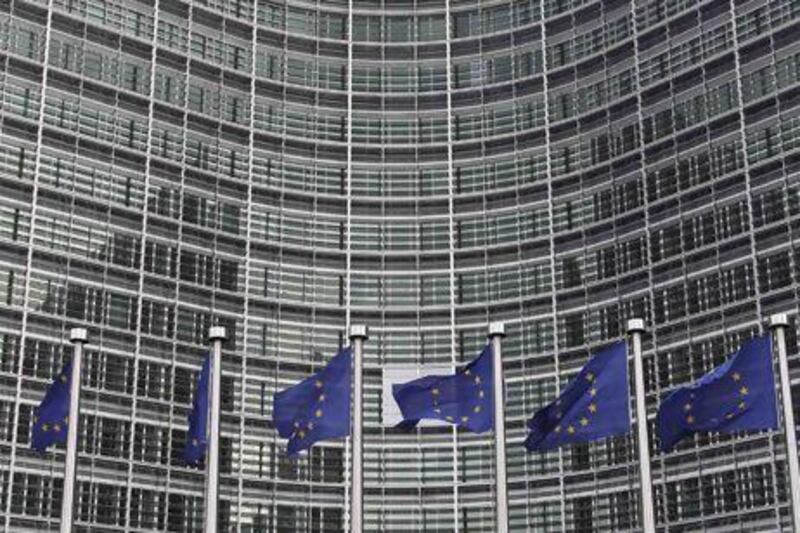European Union finance ministers showed yesterday they are not pathologically incapable of consensus, despite years of evidence to the contrary.
But it was no walk in the park. After 14 hours of gruelling negotiations yesterday they agreed to put the European Central Bank (ECB) in charge of euro-zone lenders in a deal that paves the way for the currency bloc's firewall fund to provide direct bailouts to banks.
"It's real progress that opens up interesting possibilities," said Pierre Moscovici, the French finance minister.
The new supervisory mechanism should be fully ready by March 1, 2014, with about 200 banks automatically qualifying for direct ECB oversight, said Michel Barnier, the EU financial services commissioner, after the talks ended at 4:30am local time in Brussels. In the interim, the €500 billion (Dh2.39 trillion) European stability mechanism (ESM) could aid banks directly using its own procedures and asking ECB supervisors to step in, he said.
Mr Barnier called the accord "a fundamental element for financial stability in Europe".
He said the ECB would have total access to banking information and would give equal treatment to non-euro nations that join the oversight system.
The heads of state and government will be looking beyond ECB supervision to other measures needed to break the links between banking woes and sovereign-debt struggles, such as who should pay to stabilise failing banks.
"I think we've agreed on the key points to create a European bank supervision that's supposed to start in 2014," Wolfgang Schäuble, the German finance minister, said after the meeting. The legal framework for the new supervisor could be in place by the end of February, allowing the ECB a full year to prepare before taking on its new duties.
Under the agreement, euro-zone finance ministers could use the ESM to recapitalise banks directly if they made a unanimous request to the ECB to take over direct oversight of a troubled institution. Finance chiefs would need to develop guidelines for when they might offer aid to banks, instead of going through national governments as they did with Spain's financial-sector rescue programme.
Ministers agreed on central oversight for banks with more than €30bn in assets or with balance sheets that represent at least 20 per cent of a nation's economic output. The guidelines include at least the top three biggest banks of every participating nation unless "justified by particular circumstances".
Finance ministers also reached accord on a UK-backed proposal for divvying up European Banking Authority (EBA) voting rights. The United Kingdom, which will not be part of the banking union, sought a requirement that EBA decisions be taken by so-called double majority voting, so nations outside the supervisory mechanism cannot be automatically overruled by those who take part.
The banking deal is a "good outcome," said George Osborne, the UK chancellor of the exchequer, or finance minister.
"It shows that when you go in with a clear and principled argument and you make your case, then you can succeed and that's what Britain has done tonight."
Anders Borg, the Swedish finance minister, endorsed the deal, saying it struck a balance between nations that take part in the common oversight and nations that stay out."These have been very tough negotiations," Mr Borg said. "Sweden will remain outside the banking union but we believe this is a good compromise."
Elsewhere in Europe, Greece's euro partners have agreed to hand over the next disbursement of the country's bailout loans.
The cash-strapped country will get a total of €49.1bn between now and March. Greece needs the money to stay afloat and avoid a potential default. Officials said Athens would get €34.3bn in the coming days.
The decision yesterday by the finance ministers of the 17 EU countries that use the euro came after Greece said it would buy back €31.9bn of its bonds from private investors at a third of their face value, lightening its crushing debt load and meeting a key condition to receive vital rescue loans.
* compiled from Bloomberg News and AP





